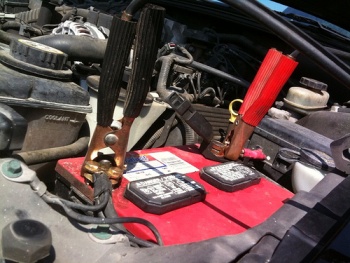Baby, it’s cold outside. Cold enough that the starter motor on your car groans instead of sings. Cold enough that you’re starting to worry that you might just not get to work some morning without a jump. A few simple things may allow you to extend your car battery life considerably, however.
Bear in mind that while batteries generally fail (as in won’t-start-your-car) in the winter, the actual damage is done during the hot summer months, when high under-hood temperatures boil the electrolyte and turn solid lead electrodes inside to sponge, reducing the battery’s capacity to produce the massive amount of current that the starter motor needs. Low temps, syrupy oil, extra demands on the alternator to run the heater, lights, wipers and defrosters, coupled with shorter days and bad weather will undoubtedly decrease you car battery life.
Here are a few tips to extend your car battery life:
Check The Voltage of your Battery
This can be done by swinging by an auto parts store – or you may consider asking your local mechanic to test your battery for you. This will prevent you from having to buy a battery meter. Before you lift your hood to test your battery, make sure that you’ve removed the keys from the ignition and have turned off any other devices and interior lights that could cause a charge to your battery. This will prevent you from getting a nasty and possibly serious shock. A healthy battery should register around 12.5 volts. Anything lower and you may want to make an appointment with your mechanic to get it recharged or replaced.
Insulate Your Battery
Most vehicles have an insulation blanket surrounding the battery, all the better to keep it cooler in the summer and warmer in the winter. It’s usually discarded the first time the battery is replaced because it’s in the way. Don’t. Keep it tucked in place.
Clean Your Battery
That green fur that collects on top of batteries is lead and copper salts, and they present two problems. First off, the fur prevents the cables from making good contact. Rinse it off with a pitcher or two of hot water. (Wear old clothes and glasses—batteries are full of sulfuric acid.) A second, less obvious issue: that residue of acid, copper wires and lead is conductive, relentlessly stealing electricity from your battery. Get yourself a non-wire (non-metallic) brush to do the scrubbing. You can clean car battery corrosion using a homemade mix of baking soda and water, or you can buy car battery cleaning solution. Apply the solution or homemade mix and use the non-wire brush to scrub away the corrosion and deposits.
Check the Cables on Your Battery
Once the area is clean, yank on the connectors. Any movement is cause to remove the clamps, clean the terminals and posts with a wire brush, followed by more rinsing and reassembly. Corrosion will sometimes eat away much of the clamp which will decrease your car battery life. Replace any flaky parts now, unless you’d rather try it than some morning in a blizzard, in a suit, and late for a meeting. The alternative is the eventual inconvenience of an emergency service call, or maybe a flatbed ride.
Test Your Battery
If you have a battery with caps, carefully pry them open. (See above about getting sulfuric acid on your good pants. I warned you). If the level of liquid electrolyte is low enough to uncover the lead electrodes, add enough distilled water (from the grocery store’s ironing section, about a buck a gallon) to make it reach the bottom of the fill holes, no more. Many batteries today are sealed, so you may be off the hook. A ten-dollar voltmeter should show around 14V with the engine running, assuring proper charging. A mechanic can check your battery with a load tester if it still doesn’t cut the mustard after a proper charge. Keep in mind that a fully-discharged battery (left-the-headlights-on-all-night discharged) can take more than a full day to accept a charge. Don’t rely on your poor, overworked alternator to attempt this; better to hook up a decent battery charger for 24 hours to bring it back up to snuff.
Don’t Beat a Dead Horse
Bear in mind that even a single instance of deep-discharge will permanently damage a battery, reducing its ability to deliver starting-level current by 25% or more. Another chilling fact: a discharged battery can freeze, rupturing the electrodes and turning it into a boat anchor in only a few hours. A battery that won’t deliver sufficient current when load-tested, won’t take a charge or is leaking simply needs to be replaced. Don’t be afraid to upgrade to a larger ampere-hour capacity battery if it will fit in the tray and allow the insulator to be reinstalled.
Time for a new battery altogether? Use Openbay to compare quotes and book service from quality local shops in your area.

